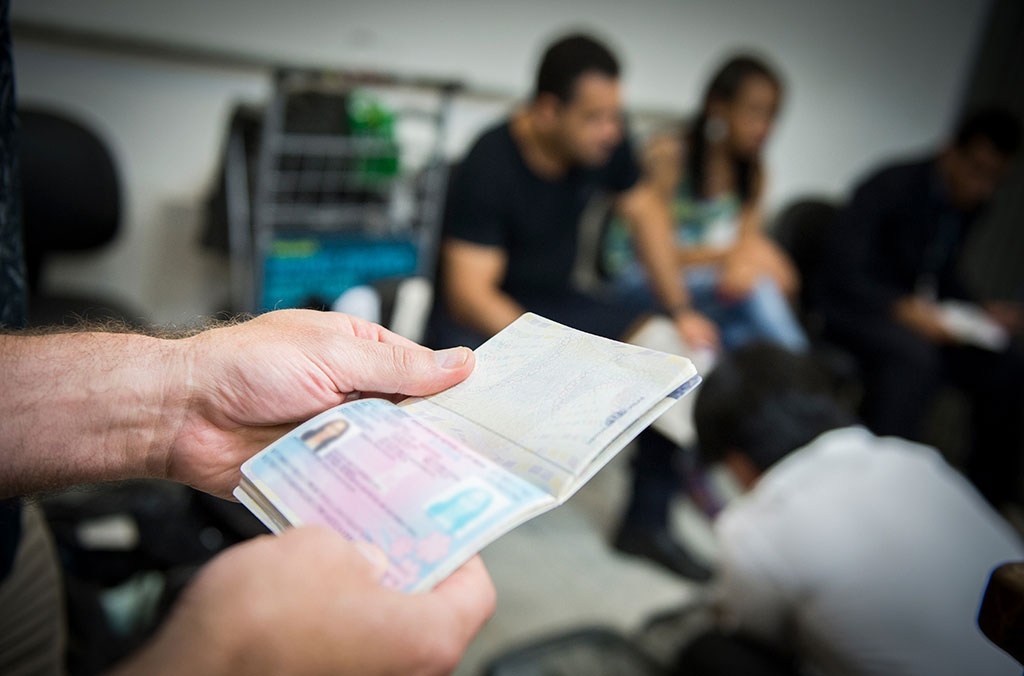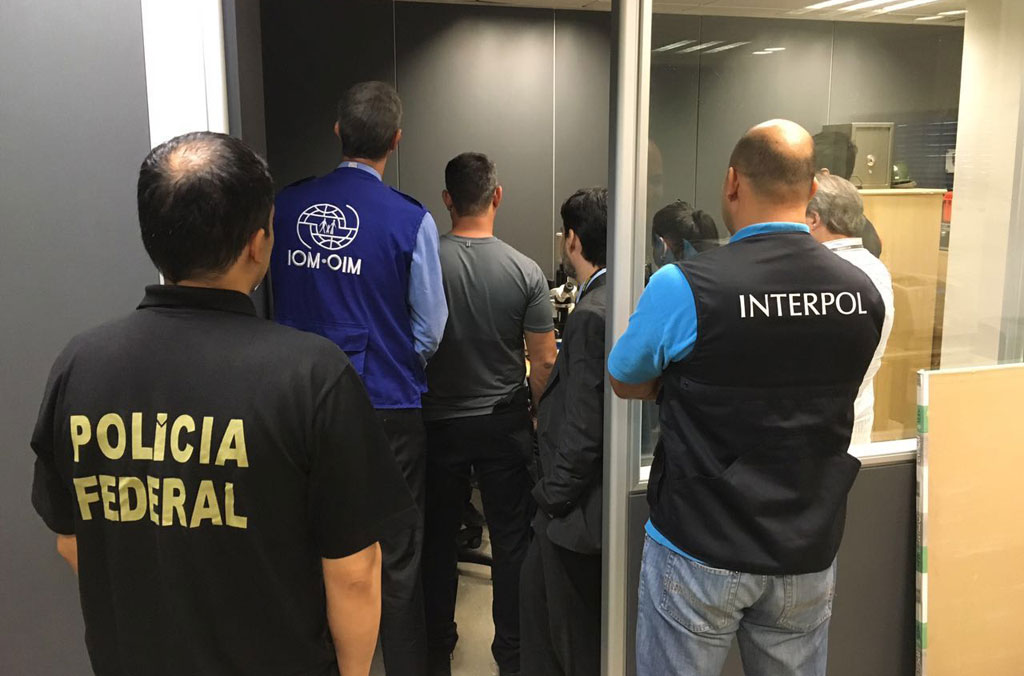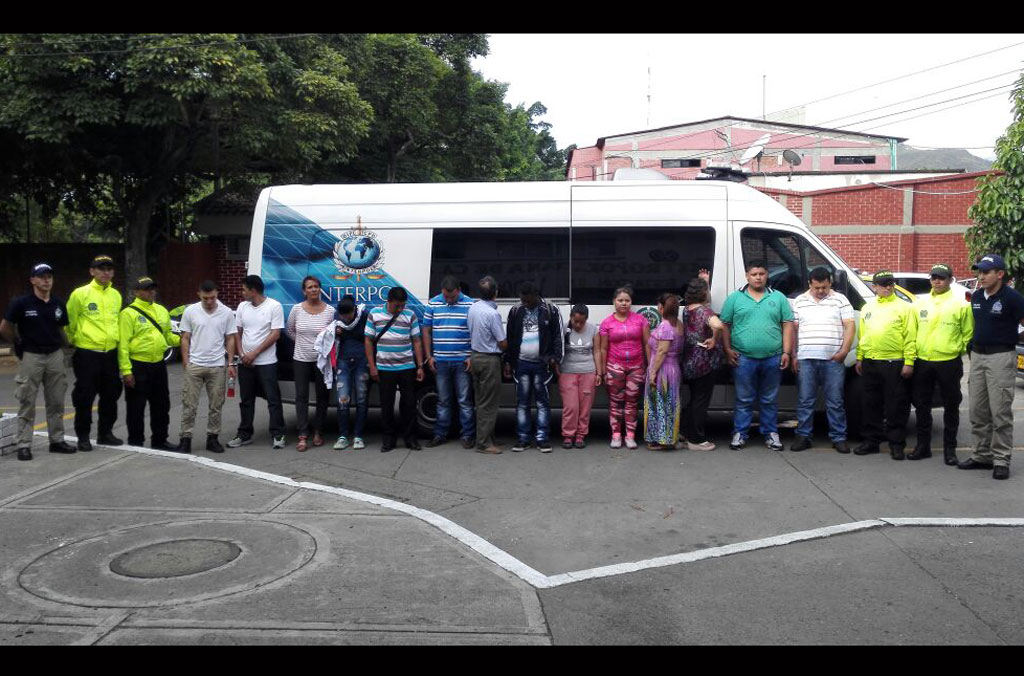An operation targeting human trafficking in South and Central America has resulted in the rescue of more than 2,700 victims, 134 arrests and the dismantling of at least seven organized crime networks.
Coordinated by INTERPOL’s Regional Bureau for South America, Operation Intercops - Spartacus III was conducted in two parts, initially concentrating on three of South America’s busiest international airports thought to be hubs for human trafficking networks: Ministro Pistarini (Buenos Aires, Argentina), Guarulhos (São Paulo, Brazil) and El Dorado (Bogotá, Colombia).
Through access to INTERPOL’s global databases, frontline police at these key locations were able to check travellers’ names and documents to help identify potential traffickers and their victims.
Based on the arrests made and intelligence gathered during this first phase (1 – 10 June), police across the 25 involved countries conducted follow-up investigations to identify and dismantle the networks involved.
The results, published ahead of the World Day against Trafficking in Persons on 30 July, underline INTERPOL’s ongoing commitment in supporting national law enforcement address this modern-day form of human slavery.
Among the victims rescued were 27 teenage girls trafficked into different countries for sexual exploitation and as cheap labour. Several girls in Ecuador who had been contacted through social media were snatched from outside their schools, before being drugged and transported out of the country.
In Peru, some 900 police officers took part in an operation targeting sexual exploitation and forced labour in the gold-mining town of La Rinconada, arresting five suspects and rescuing 190 women and 250 men.
Other key results from the operation include:
- The closure of a Brazilian adoption agency suspected of trafficking children and babies from Eastern Europe;
- The dismantling of the ‘Paniagua’ network in Colombia which is believed to have trafficked hundreds of women and girls from South America to China. Headed by a 34-year-old Colombian woman and her son, victims were recruited with promises of a better life in Guangzhou. Provided with fake identification documents, travel and accommodation, victims would then be forced into sexual slavery;
- The arrest of Red Notice subject Johnny Eliexer Cordero Belisario, wanted by the Dominican Republic for large-scale trafficking in human beings and sexual exploitation. The 32-year-old Venezuelan national is thought to have lured hundreds of women from Venezuela and Colombia to the Dominican Republic where they would be forced into prostitution;
- The rescue by Honduras National Police of a two-year old orphan girl who was the victim of attempted smuggling with fraudulent identity documents;
- Peruvian police arrested five men suspected of being part of a regional human trafficking network, and rescued a Colombian woman and teenage girl, both working in enforced prostitution in Lima;
- Two Ecuadorian women were arrested at Chile’s Arturo Merino Benítez airport as they tried to enter the country with three children using fraudulent identity documents;
- Arrest in Bolivia of a man and woman whose commercial company recruited young men and women with promises of highly paid jobs but instead would force them to work in slave-like conditions for no pay. As part of the operation, Bolivian authorities conducted a national awareness campaign telling citizens how to protect themselves from the threat of human trafficking.
“The effects of this large scale trans-border police operation will reach far beyond the Americas, and underlines the value of INTERPOL in helping police in source, transit and destination countries work together in tackling the criminal networks behind human trafficking,” said Tim Morris, INTERPOL’s Executive Director for Police Services.
“This is just one example of INTERPOL’s ongoing work in combating human trafficking which affects every region of the world, to ensure that police have the training and tools they need to identify routes, arrest offenders and rescue victims,” added Mr Morris.
Migrant smuggling
In addition to targeting trafficking in human beings, Colombia also led several operations targeting migrant smuggling networks. One investigation resulted in the arrest of 14 suspects and the dismantling of a criminal network believed to have smuggled hundreds of victims from Ecuador to Panama via Colombia and Venezuela.
In another case, 18 suspects were arrested for membership of a migrant smuggling network believed to have made victims pay as much as USD 1,400 for transport in abysmal conditions between Colombia and Ecuador. Rescued victims included pregnant women and women with very young babies, several requiring urgent medical attention.
“The success of the operation is not just about the number of victims rescued or criminals arrested, but also about making sure the right skillsets and INTERPOL police services are in place for this work to continue,” said Colonel Juan Carlos Gomez Arias, Head of the INTERPOL National Central Bureau of Colombia.
“The results reflect the quality of the training delivered ahead of the operation. The intelligence South American police forces have collectively gathered will enable us to continue dismantling the networks behind this crime at the national, regional and international levels,” added the Head of INTERPOL Bogotà.
Intercops
Building on Brazil’s ‘International Cooperation in Airports - Intercops’ model which provides regional training on tackling crimes relying on airport transit, a series of training workshops, including practical exercises at airports was delivered by Brazilian police authorities across the region, supported by the International Organization for Migration and INTERPOL’s Regional Bureau in Buenos Aires.
“Operation Intercops - Spartacus III was an excellent exercise in strengthening police action against human trafficking in Guarulhos Airport and other airports in Brazil,” said José Gomes Monteiro Neto, Intercops programme coordinator for the Brazilian National Police.
“It enabled us to observe regional trends and identify the ways in which trafficking networks use Brazil as an entry point for North America or as an exit route from South America to Europe, boosted our understanding of the phenomenon and our ability to tackle it,” he added.
With the rescue of more than 1,000 victims, Operations Spartacus I and II (2012 and 2014) illustrated the extent to which South America is being used for human trafficking, smuggling and exploitation and the border security challenges this poses for law enforcement.
The 25 participating countries are: Argentina, Bolivia, Brazil, Canada, Chile, China, Colombia, Costa Rica, Dominican Republic, Ecuador, El Salvador, Guatemala, Honduras, Israel, Nicaragua, Panama, Paraguay, Peru, Portugal, Russia, Sint Maarten, Spain, United States, Uruguay and Venezuela.






